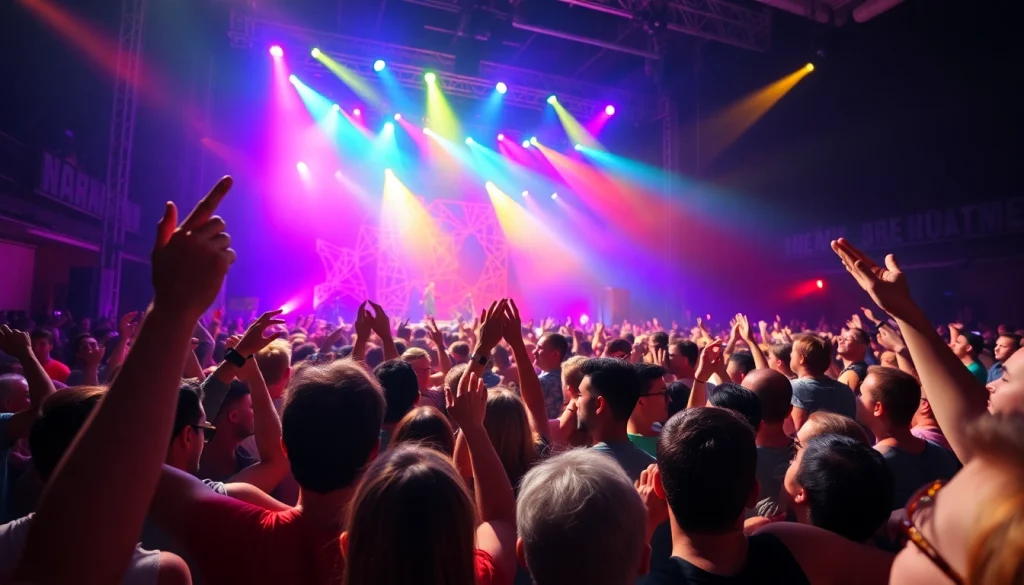Understanding the Passion of Live Music Fans
Live music has a unique power to evoke emotions, create connections, and foster a sense of belonging among its fans. The raw energy of a live performance captures audiences like few other experiences can, making the relationship between fans and artists deeply intimate. For those who identify as Live Music Fans, this passion is not just about the music; it’s about the communal experience that transcends everyday life. This article explores the anatomy of this fervor, the culture surrounding live music, and how stakeholders can better engage this vibrant community.
The Unique Connection to Live Music
The connection formed during live music events is multi-faceted and deeply rooted in human psychology. Music has historically served as a communal activity, bringing people together to share experiences. Unlike listening to music at home or digitally, live performances involve real-time interaction with the artist and fellow fans. The atmosphere of a concert—a combination of energy, social interaction, and emotional release—plays a critical role in why fans gravitate towards these events.
Fans often describe the atmosphere of a concert as electric, where the collective energy elevates the experience to something transcendental. It is not uncommon for individuals to form lasting friendships based on shared concert experiences. This sense of community cultivates loyalty, with many fans attending multiple shows and developing emotional connections to both the artists and their music.
Demographics and Trends Among Live Music Fans
Live music attracts a diverse array of fans spanning various ages, backgrounds, and musical tastes. However, there are observable trends that can help industry stakeholders understand this audience better. According to recent studies, younger generations, particularly Millennials and Gen Z, are driving the live music scene. They prioritize experiences over material possessions, making concerts, festivals, and events an integral part of their lifestyle.
Demographic data suggests that women are equally as likely as men to participate in live music events, and the appeal of different genres varies significantly across age groups. While older fans may lean towards classic rock or jazz, younger attendees often favor pop, hip hop, and electronic dance music (EDM). Understanding these demographics allows event planners and promoters to tailor experiences that resonate with specific audiences.
The Emotional Impact of Concert Experiences
The emotional impact of attending a concert can be profound. For many fans, these events serve as an escape from daily responsibilities. Studies have shown that live music can lower stress levels, uplift mood, and even foster feelings of joy and connectedness. The act of singing along with hundreds or thousands of others creates a sense of solidarity that can be healing for individuals experiencing loneliness or isolation.
Moreover, concerts often evoke nostalgia, taking fans back to significant life moments associated with the music. This emotional resonance not only contributes to personal well-being but also deepens the bond between the fan and the music, prompting repeat attendance and loyalty to the artist.
Building a Community for Live Music Fans
Building a community for live music fans involves creating spaces that encourage interaction, engagement, and a sense of belonging. By understanding their audience’s needs and preferences, promoters and artists can forge lasting connections with fans that extend beyond the concert experience.
Creating Spaces for Interaction and Engagement
Physical venues play a crucial role in the live music experience. Beyond just the stage, they serve as social hubs where fans can meet, interact, and share their love for music. Venues that offer lounges, fan zones, or opportunities for pre- and post-show interactions can enhance the overall experience. Examples include backstage tours, meet-and-greet opportunities, and fan engagement areas where attendees can share stories or swap merchandise.
Moreover, creating an environment that is welcoming and inclusive will appeal to a broader audience. Ensuring that venues are accessible and that staff are trained in fostering an inclusive atmosphere can help break down barriers for fans who may feel intimidated or unwelcome.
Leveraging Social Media to Connect Fans
Social media has transformed the way fans engage with music, artists, and each other. Platforms like Instagram, TikTok, and Twitter have become vital tools for promoting events and fostering community interaction. Artists can cultivate their fan base by sharing behind-the-scenes content, engaging in live Q&As, or hosting Instagram Live sessions.
Additionally, fan-led initiatives on social media—such as fan clubs or online communities—can enhance the sense of belonging among fans. Encouraging fans to share their concert experiences, photos, and stories creates a rich tapestry of content that showcases the community’s passionate nature. Event organizers can also create dedicated hashtags to facilitate sharing and interaction, making it easier for fans to connect and grow their networks.
Collaborating with Local Artists and Venues
Local artists and smaller venues often foster unique interactions within communities. Collaborations between established and emerging musicians can create opportunities for fans to discover new music and support local talent. Hosting events that combine headliners with local acts can introduce fans to a broader range of genres and styles, enriching the overall live music experience.
Moreover, partnerships with local businesses—whether food vendors at music festivals or merchandise booths set up by artisans—can enhance the sense of community. Supporting local talent not only promotes diversity in the music scene but also strengthens the local economy, creating goodwill and a dedicated following among local fans.
Enhancing the Live Music Experience
Enhancing the live music experience is vital for engaging fans and encouraging repeat attendance. By providing innovative offerings, event professionals can elevate the overall excitement surrounding concerts and festivals.
Innovative Merchandise for Live Music Fans
Merchandise extends beyond conventional items like t-shirts and posters. Innovative merchandise tailored for live music fans can include unique items such as limited-edition vinyl, artist collaborations with local artisans, or experiential packages bundled with concert tickets. These offerings create added value for fans and facilitate deeper connections with the music.
Additionally, eco-friendly merchandise options are increasingly appealing to a sustainability-conscious audience. Brands that prioritize environmentally-friendly production methods will resonate well with fans who value sustainability in their purchasing decisions.
VIP Experiences: Worth the Investment?
VIP experiences have gained traction in the live music realm, offering fans exclusive access to backstage areas, premium seating, and meet-and-greets. While these opportunities often command a higher price point, they can present substantial value to dedicated fans. Understanding the demographics and motivations of your audience is crucial when marketing these experiences.
For many fans, the chance to interact with their favorite artists is a once-in-a-lifetime opportunity. Ensuring that VIP packages offer genuine value, such as additional perks or unique interactions, can enhance satisfaction and foster loyalty to both the artist and the event organizer.
Utilizing Technology to Elevate Live Events
Technology plays an increasingly vital role in enhancing the live music experience. From augmented reality (AR) applications that bring concert visuals to life to mobile apps that allow for seamless ticket purchasing and event navigation, the integration of technology can significantly improve fan engagement.
Live streaming options have also become common, allowing fans unable to attend a concert in person to participate virtually. This not only widens the audience but can also create additional revenue streams for artists and promoters. Implementing technology strategically can create a more immersive and interactive experience, making attending a concert feel more inclusive and accessible.
Marketing Strategies for Engaging Live Music Fans
An effective marketing strategy for engaging live music fans is essential for driving ticket sales and creating lasting relationships. Understanding the audience, crafting targeted campaigns, and utilizing the right channels is key to maximizing engagement.
Targeted Advertising: Finding Your Audience
Targeted advertising is crucial for reaching specific audiences in the live music space. Utilizing data analytics and audience segmentation tools, organizations can tailor their advertising efforts to resonate with particular demographics based on age, location, and musical preferences. This method not only improves the effectiveness of ad spend but also connects fans with experiences that genuinely align with their interests.
Additionally, retargeting ads can play a critical role in keeping potential attendees engaged. For instance, if a fan visits a ticketing site but does not complete a purchase, follow-up ads reminding them of upcoming shows can encourage conversions.
Effective Email Campaigns for Concert Promotion
Email marketing remains one of the most powerful tools for reaching live music fans. Building a robust email list allows promoters to send personalized content directly to interested individuals. Providing exclusive offers, pre-sale notifications, and other concert-related information can create a sense of urgency and excitement.
Incorporating storytelling elements—such as sharing an artist’s journey or highlighting the creation of an upcoming album—can resonate well with fans, creating deeper emotional connections. Regularly updating fans with behind-the-scenes content or upcoming shows keeps them engaged and informed.
Using Video Content to Engage Fans
Video content is a dynamic way to engage live music fans, offering them a glimpse into the music experience. Whether through concert highlights, artist interviews, or behind-the-scenes features, video content can evoke emotions and build anticipation. Platforms such as TikTok and Instagram Reels have opened up new avenues for video marketing, particularly for younger audiences.
Engaging video campaigns that invite fans to participate—such as sharing their concert experiences or creating their videos around specific themes—can create a ripple effect, expanding marketing reach and promoting an artist’s concert or festival.
Measuring Success with Live Music Fans
Understanding success in engaging live music fans requires metrics and strategies tailored to evaluate performance effectively. By leveraging key performance indicators (KPIs), stakeholders can adapt their strategies and continuously improve the fan experience.
Key Metrics for Assessing Engagement
Various metrics can provide insight into fan engagement, including ticket sales, demographics, social media interactions, and attendance rates. Analyzing these metrics can reveal underlying trends, such as the most popular genres or successful marketing channels.
Additionally, measuring fan sentiment through social media mentions and online reviews can provide qualitative data that sheds light on their experiences and preferences. Tools that analyze sentiment can help organizations understand how well they are connecting with their audience.
Feedback Mechanisms: Surveys and Reviews
Incorporating feedback mechanisms is invaluable for gaining insights into the fan experience. Post-event surveys can help gather direct insight into audience satisfaction, while online reviews provide another layer of qualitative feedback. Questions should cover aspects such as venue and performer satisfaction, logistical issues, and overall enjoyment.
Moreover, actively encouraging fans to submit their feedback via email or social media channels can foster goodwill and demonstrate that their opinions matter. This connection can lead to enhanced loyalty and repeat attendance at future events.
Adapting Strategies Based on Fan Insights
Finally, using the data collected from feedback mechanisms and engagement metrics is vital for refining strategies over time. If a specific genre or format consistently draws larger audiences, this insight can guide future events. Additionally, understanding areas for improvement—whether related to venue logistics or artist performances—can enhance the overall fan experience.
Iterative strategies based on ongoing insights ensure that event promoters remain responsive to fan needs, cultivating a loyal community that feels valued and understood.





